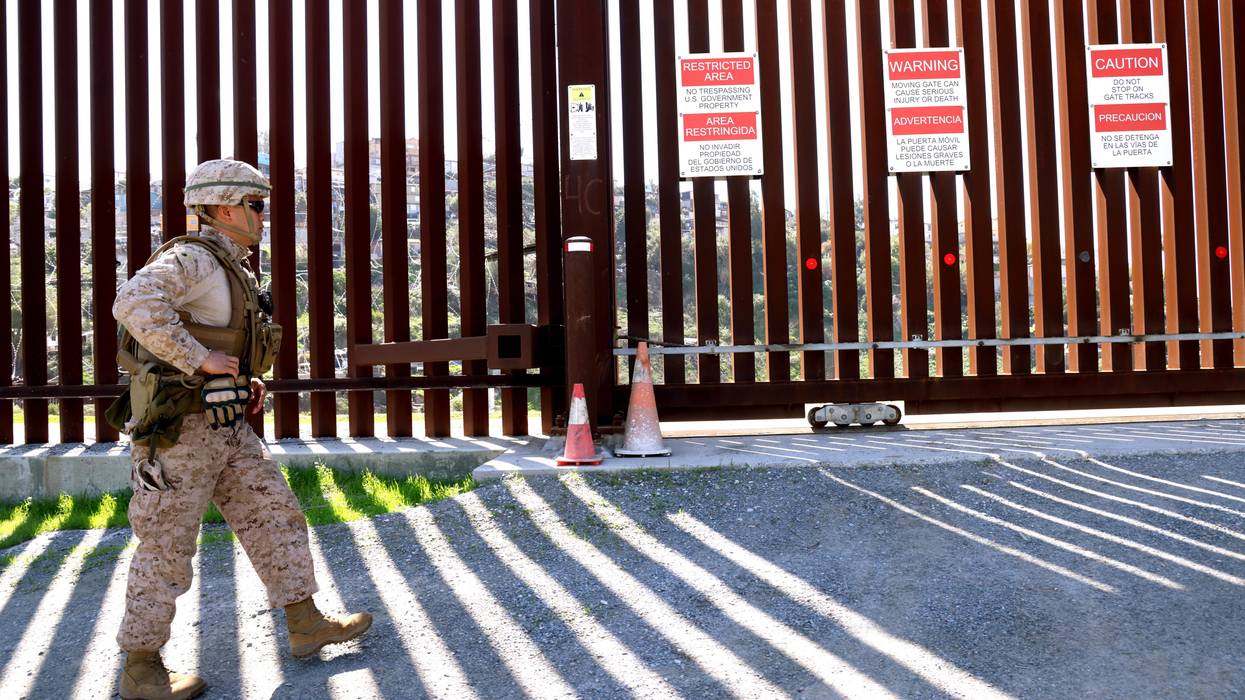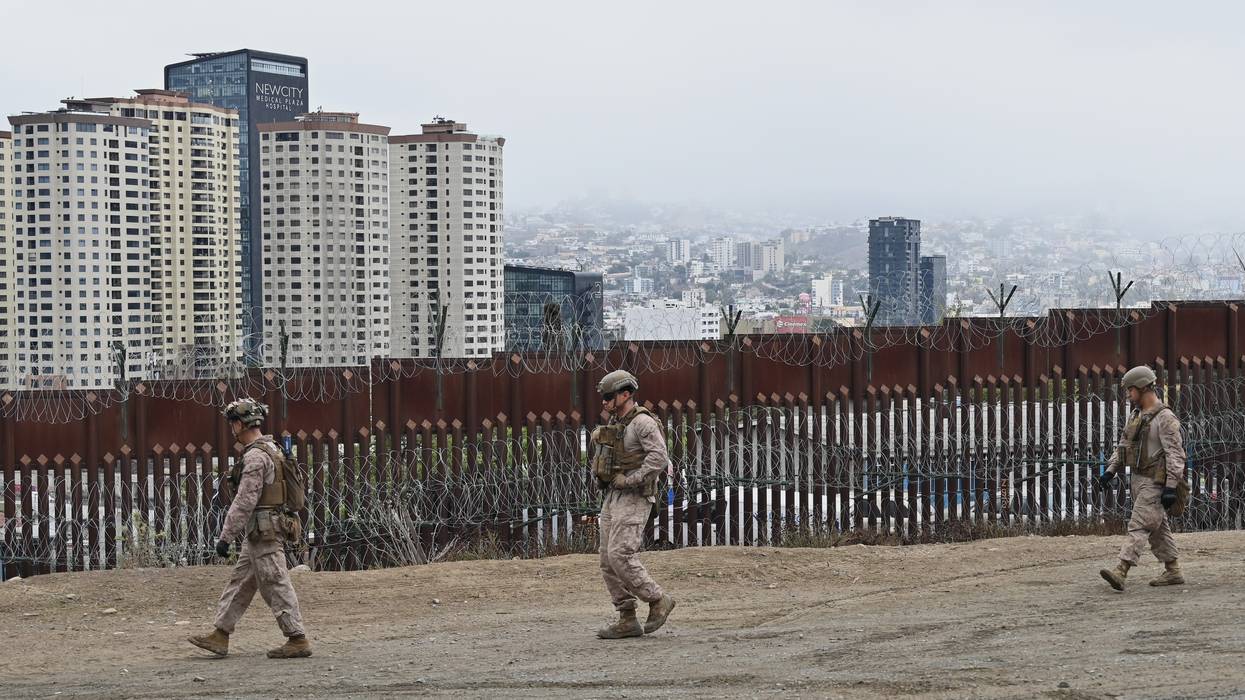'Democratic Freedoms' Under Threat as Migrants Charged for Entering Trump Militarized Border Zone
"As presidential overreaches pile up, they underscore the urgent need for Congress and the courts to reassert their roles as checks on executive authority," said two experts at the Brennan Center for Justice.
At least 28 migrants who crossed into the U.S. over the southern border could face up to a year in detention and $100,000 in fines after being charged Monday not only with "illegal entry" but also with violating "security regulations"—the result of U.S. President Donald Trump's transformation of the border into a 170-mile-long "National Defense Area."
As Common Dreams reported last month, the White House has pushed to create a "buffer zone" patrolled by U.S. troops along a stretch of the southern border in New Mexico, with soldiers empowered to immediately detain anyone who "trespasses" in the 60-foot-wide area before handing them over to Customs and Border Protection (CBP).
The Washington Post reported that the migrants were apprehended on a route that has been used for years by people entering the U.S., and were accused in court filings of violating "the order issued on April 18, 2025, by the U.S. Army Garrison Fort Huachuca military commander designating the New Mexico National Defense Areas, also known as the Roosevelt Reservation, as both a restricted area and a controlled area under Army Regulation 190-13."
Carlos Ibarra, a court-appointed attorney for the migrants facing charges, told the Post that the government was "piling on" by adding the security violation charge, and said that "if these folks had $100,000, they wouldn't be coming over here."
The arrests came after Defense Secretary Pete Hegseth made an appearance at the border last week, saying in a video posted on the Pentagon's social media accounts, "This may as well be a military base."
"Any illegal attempting to enter that zone is entering a military base," he said. "You add up the charges of what you can be charged with, misdemeanors and felonies, you could be looking up to 10 years in prison when prosecuted."
Ordinarily people who are charged for crossing the border without authorization have faced a potential six-month jail term and up to $5,000 in fines.
The area was turned into a de facto military base when Trump signed an executive order earlier this month giving the Pentagon jurisdiction over the Roosevelt Reservation, saying in a memo that the southern border "is under attack from a variety of threats" and requires a more direct security role for the U.S. military.
According to the Migration Policy Institute, apprehensions of migrants by U.S. Border Patrol sank to just 7,000 in March, the fewest in at least 25 years.
The memo creating a military installation at the border was designed to give federal troops a "legitimate military reason" to apprehend, search, and detain troops without violating the Posse Comitatus Act and without Trump having to invoke the Insurrection Act of 1807, the Brennan Center for Justice explained in a blog post on Monday.
The Posse Comitatus Act prohibits federal armed forces from engaging in civilian law enforcement without the approval of Congress. The Insurrection Act provides an exception to that law, as does a loophole in the Posse Comitatus Act called the "military purpose doctrine." Trump's advisers have so far recommended against invoking the Insurrection Act, which authorizes the president to deploy military forces inside the United States to enforce the law in certain situations.
Trump's memo allowing the military to "act as a de facto border police force," wrote Elizabeth Goitein and Joseph Nunn at the Brennan Center, "could have alarming implications for democratic freedoms."
"It continues a pattern of the president stretching his emergency powers past their limits to usurp the role of Congress and bypass legal rights," they wrote. "He has misused a law meant to address economic emergencies to set tariffs on every country in the world. He declared a fake 'energy emergency' to promote fossil fuel production. And he dusted off a centuries-old wartime authority to deport Venezuelan immigrants, without due process, to a Salvadoran prison notorious for human rights violations."
"As presidential overreaches pile up, they underscore the urgent need for Congress and the courts to reassert their roles as checks on executive authority," wrote Goitein and Nunn.
Along with concerns about the legality of Trump's move, Goitein and Nunn noted that troops "are trained to fight and destroy an enemy; they're generally not trained for domestic law enforcement." Empowering them to engage with civilians now could make it easier for the administration to "justify uses of the military in the U.S. interior in the future."
"Asking them to do law enforcement's job creates risks to migrants, U.S. citizens who may inadvertently trespass on federal lands at the border, and the soldiers themselves," they wrote.
Rebecca Sheff, senior staff attorney at the ACLU of New Mexico, wrote last week that Trump's creation of a military installation on public border land "represents a dangerous erosion of the constitutional principle that the military should not be policing civilians."
"By authorizing service members to detain, search, and conduct 'crowd control,' these new authorities undermine our state's values of dignity, respect, and community," said Sheff. "We don't want militarized zones where border residents—including U.S. citizens—face potential prosecution simply for being in the wrong place. This isn't how we want to be in relation with our neighbors. This dangerous expansion of military authorities threatens both our civil liberties and the cultural fabric that makes our borderlands unique."
Hina Shamsi, director of the ACLU National Security Project, also described potential impacts on U.S. citizens who live in border areas.
In addition to endangering migrants who cross the border, Shamsi wrote, Trump's actions "are worsening the conditions under which civilian border communities live."
"Our southern border is home to approximately 19 million people, in addition to the regular business and trade commuters who come across the border every day," wrote Shamsi. "The new policy has serious implications for border residents living under this expanded militarized zone, which includes cities like San Diego, California; Nogales, Arizona; El Paso, Texas and other heavily populated, thriving communities. People in these areas could now face federal prosecution for trespassing if they unintentionally walk or drive onto a designated 'national defense area.'"
Shamsi warned that while Trump has not yet invoked the Insurrection Act, "his administration continues to invest in the theater of war," and called on Congress "to insist on oversight for these expanded actions... and to call for safeguards and transparency to protect border residents from escalating military control over their daily lives."


